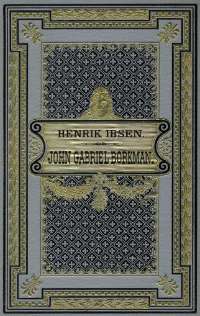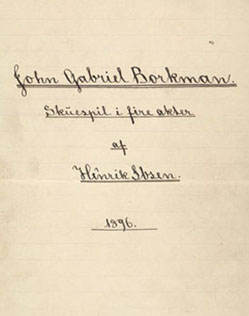

Brief description
Ibsen wrote John Gabriel Borkman in Christiania in 1896. The play is partly based on material he had become acquainted with a whole generation earlier. In the Christiania of the 1850s there was a court-case against a senior officer. He was found guilty of fraud and committed to prison with hard labour for four years. After his years in prison he cut himself off completely for many years, and is said not even to have spoken to his wife. Ibsen heard of the case during his first stay in Christiania (1850–51) and followed up the officer’s subsequent fate – as far as he could – during his second period in Christiania (1857–64).
Another, closer, source of inspiration for Ibsen’s work with John Gabriel Borkman was Georg Brandes' monumental work on Shakespeare, of which Ibsen read at least parts in the summer of 1896. Brandes’ angle on Shakespeare was strongly influenced by some of Nietzsche’s ideas. Two central concepts in his philosophy, those of the superman and the will to achieve power, play a large part in Ibsen’s play. It is uncertain whether Ibsen read texts by Nietzsche, but there is absolutely no doubt that he read about Nietzsche, in Brandes' work among other works.
We assume that Ibsen began to plan John Gabriel Borkman some time during 1895, but the actual writing was not started until the summer of 1896.
In the spring Georg Brandes had invited Ibsen to London. In a letter dated 24 April 1896, Ibsen refused this invitation on the following grounds, among others:
«In addition, I am busy preparing a big new piece of work, and I do not want to postpone this any longer than necessary. I might easily be hit on the head by a roof-tile, you know, before I 'had time to make up the last verse'». And then what?» [read the letter in HISe]
Only two days later, on 20 October, Ibsen sent the final copy of the manuscript to his publisher, Jacob Hegel. Thus the writing of the fair copy must have taken place at the same time as the working out of the play.
John Gabriel Borkman came out on December the fifteenth, 1896, at Gyldendalske Boghandels Forlag (F. Hegel & Søn) in Copenhagen, Christiania and Stockholm, and consisted of 12 000 copies, up to then the largest first edition of any of Ibsen’s works. This was not enough, however, and on account of a large number of advance orders, the book had to be reprinted in a further 3 000 copies, even before it was on sale. Thus the first and the second issues were released simultaneously. Its reception was good for the most part.
As had been the case with Hedda Gabler (1890), The Master Builder (1892) and Little Eyolf (1894), the English publisher William Heinemann published John Gabriel Borkman in a «mini-edition» in Norwegian (12 copies) in London in order to secure his copyright. This took place on 12 December 1896, three days before the Gyldendal edition. Shortly after the original edition, translations of the play came out in English, French, Russian and German.
The first public performances of John Gabriel Borkman were in the form of readings. The first one took place at the Avenue Theatre in London on 14 December 1896, and was arranged by William Heinemann in order to secure his copyright in England. The following day, 15 December 1896, there is said to have been a reading at the Copenhagen Municipal Teachers' Association, led by the theatre director P. A. Rosenberg. The first professional stagings of John Gabriel Borkman took place in Helsinki on 10 January 1897 at two theatres: Svenska Teatern and Suomalainen Teaatteri (the Finnish theatre). Both these productions seem to have been well received by their audiences and the critics. The play was Ibsen's greatest success in the theatre since A Doll’s House.
(From ibsen.net)
Plot summary
John Gabriel Borkman is a former bank-manager who, sixteen years before the play begins, has been imprisoned for financial fraud. He believes he was innocent. He had used the customers' money to invest in an industrial empire, and before he could pay back all the loans, he was reported by his friend Hinkel, who was in love with Ella Rentheim, Borkman's sweetheart in youth. Since being released from prison eight years ago, Borkman has been living on the upper floor of Ella's property. His wife Gunhild, Ella's twin sister, lives on the floor below, but the two of them have no contact with each other. Their son, Erhart, now in his twenties, is a student in the city.
Borkman never goes out, but is occasionally visited by Vilhelm Foldal, one of those who lost everything as a result of Borkman's financial speculations. Foldal encourages him in his conviction that one day the staff of the bank will come and ask him to return to his old position as bank-manager.
As a young man Borkman deserted his great love Ella, and instead married her twin, Gunhild, «in return for» the post as bank-manager. When he was imprisoned, Ella took care of Erhart, and became closely attached to him, but he has now become acquainted with a divorcee, Fanny Wilton, and goes abroad with her and Foldal's daughter, Frida.
At the beginning of the play Ella has come to ask that Erhart may live with her and take her name. She has just found out that she is suffering from a mortal disease. Borkman agrees, but his wife Gunhild refuses to allow her twin Ella, with whom she has had no contact all these years, to take over her son. There is a bitter reckoning between the two sisters. Erhart turns up and says that he cannot live for either of them, or for his father. John Gabriel Borkman leaves the house and goes out into the winter night with Ella, and dies.
(Source: Merete Morken Andersen, Ibsenhåndboken, Gyldendal Norsk Forlag, 1995.)
Read John Gabriel Borkman (in Norwegian)
In the online version of the official Ibsen edition (HISe), you can read John Gabriel Borkman in various formats. This content is currently only available in Norwegian. Follow the links below to read the play:
Introduction to the work (in Norwegian)
The online version of the official Ibsen edition (HISe) offers extensive information about John Gabriel Borkman in Norwegian. Follow the links below to read about various aspects connected to the play.
- Background
- Creative process
- About the publication
- Stagings in Ibsen's life time
- Parodies in Ibsen's life time
- More information
Reviews
Here you can find reviews in full text and an overview of registered reviews in various languages.
- Reviews from Ibsen's life time in full text
- Reviews registered in the Ibsen bibliography (nb.no)
- Reviews registered in "Norsk litteraturkritikk" (UiO)
Translations
- The Multilingual Ibsen
- Translations in various languages
- Overview of translations from Ibsen's lifetime (HISe)